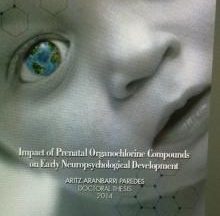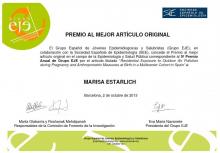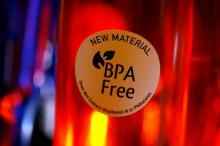
14/10/2014
Aritz Aranbarri defended his doctoral thesis
On Tuesday 23rd September, the doctoral thesis with International reference entitled: “Impact of Prenatal Organochlorine Compounds on Early Neuropsychological Development” […]

28/08/2014
Jordi Sunyer, awarded with the “Nobel prize” for environment and health research
Prof. Jordi Sunyer has received the most prestigious award in Environmental Epidemiology, the John Goldsmith Award for sustained and outstanding contributions to […]

29/07/2014
Clara Rodriguez defends her doctoral thesis
Last July 8, at Miguel Hernandez University (UMH), took place the defense of the PhD Thesis Diet quality during pregnancy and […]

07/03/2014
“High seafood intake causes increased arsenic levels in pregnant women”
The INMA Project (Infancia y Medio Ambiente-Environment and Childhood) has analyzed levels of urinary arsenic (inorganic and organic) in […]

24/01/2014
It is advisable to reduce the consumption of large oily fish during pregnancy
Interview with Jesús Ibarluzea published in diariovasco.com Link to the interview

03/11/2013
Awards 2013 INMA Project
During the year 2013 the INMA Project has received 8 awards: XX PREMIO DE LA SOCIEDAD ESPAÑOLA DE EPIDEMIOLOGÍA AL […]

19/09/2013
Researcher Eva Morales receives the SEE award for the best article of the year
The Spanish Society of Epidemiology (SEE) has awarded the article ‘Circulating25-hydroxyvitamin D3 in pregnancy and infant neuropsychological development’ of CREAL […]

20/06/2013
Pollution may be a cause of autism
Autism has been a brain disorder that many scientists have sought to explain but, now, a group of U.S. researchers […]

06/06/2013
Children’s exposure to pollution is associated with hyperactivity
Children’s exposure to air pollution related to traffic is significantly associated with higher scores of hyperactivity at age 7,according to […]

30/05/2013
“There is a direct relationship between maternal obesity and decreased cognitive function of the child”
Interview with Maribel Casas, author of the study “Maternal pre-pregnancy overweight and obesity, and child neuropsychological development: two Southern […]

21/05/2013
“We are at a crucial moment for the protection of health and the environment”
“In the last newsletter we talk about the report published by the World Health Organization (WHO) and the United Nations Environment Programme […]

15/05/2013
“Maternal obesity reduces child cognitive function”
Mother’s Obesity before pregnancy is associated with reduced cognitive function of the child at 14 months of age. This is the […]
